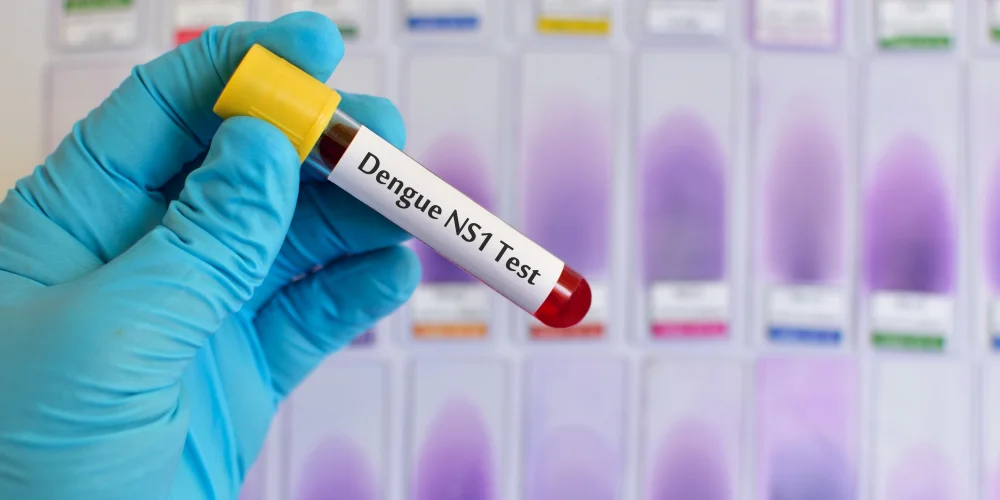Dengue NS1 Antigen Test
Early Diagnosis of Dengue Infection
It is the Dengue NS1 Antigen Test is a vital diagnostic tool that is used to identify the presence of dengue virus’s non-structural proteins 1. (NS1) in blood. The test is highly efficient in identifying dengue-related illness in the initial stages usually in the initial few days following the onset of symptoms. The early detection of dengue by this test NS1 Antigen Test allows for prompt medical intervention, which is essential in managing the symptoms and treatment of dengue fever. The early detection of the virus aids healthcare professionals in implementing treatment options and monitor the patient’s health condition, thus reducing the chance of serious complications like dengue hemorrhagic fever or shock syndrome. This test is particularly important in areas where dengue is endemic, and where the speedy and precise diagnosis could dramatically impact the outcomes for public health.

When is the Dengue NS1 Antigen Test Prescribed?
The Dengue NS1 Antigen Test is prescribed in several clinical scenarios:
- Early Diagnosis of Dengue Fever : This test is recommended for individuals showing early symptoms of dengue fever, such as high fever, severe headache, retro-orbital pain (pain behind the eyes), joint and muscle pain, rash, and mild bleeding (e.g., nose or gum bleed).
- Differentiating Dengue from Other Febrile Illnesses : The NS1 Antigen Test helps distinguish dengue fever from other causes of acute febrile illnesses, ensuring appropriate treatment.
- Monitoring Outbreaks : During dengue outbreaks, this test is used to quickly identify cases and help contain the spread of the virus.
Preparation for the Dengue NS1 Antigen Test
No special preparation is needed to take preparation for the Dengue NS1 Antigen Test. Patients are able to take a normal diet and drink before the test. The procedure consists of a simple blood draw that is later analyzed to determine the existence of NS1 antigen. This test is non-invasive and provides fast and precise results, allowing health professionals to begin the appropriate treatment and strategies swiftly. The detection of dengue early by testing with the NS1 Antigen Test is critical in reducing complications and enhancing the patient’s outcomes.
Parameters Considered During Dengue NS1 Antigen Test
It is the Dengue NS1 Antigen Test detects the presence of the NS1 protein that is made by dengue virus. A presence NS1 in blood is a sign of that there is a dengue infection in progress. This test is particularly helpful in the initial stage of disease typically before antibodies can be detected.
Time Required for Dengue NS1 Antigen Test Report
It is Dengue NS1 Antigen Test is an extremely fast procedure. A blood sample will be taken and then sent to the lab to be analyzed. Results are usually delivered within a few hours or a day which allows for quick diagnosis and prompt medical intervention.
Dengue NS1 Antigen Test Price
The test is offered at Chirayu Super Speciality Hospital, the Dengue NS1 Antigen Test price is Rs.800. This low-cost diagnostic test will ensure the availability of crucial early detection and treatment of dengue fever. It also contributes to improved results for patients.
Booking an Appointment for Dengue NS1 Antigen Test
Scheduling an appointment for the Dengue NS1 Antigen Test at Chirayu Super Speciality Hospital is easy and simple. Patients can book their appointment via the website of the hospital or by contacting the support team. The hospital’s staff is committed to providing prompt and professional services to satisfy all of your requirements of healthcare.
What Our Patients Say
Hear from our valued patients about their experiences at Chirayu Super Speciality Hospital and how our care has made a positive impact on their health and well-being.


Staff was caring and made the process smooth and stress-free.


Highly recommend for quick and accurate dengue testing.


Chirayu Hospital provided excellent support during my dengue treatment.


Clear explanations and prompt diagnosis made a big difference.


Efficient service and comprehensive care during my dengue test.


Quick and accurate dengue diagnosis helped me start treatment immediately.
Frequently Asked Questions
Here, we provide answers to some of the most commonly asked questions to help you better understand our services, policies, and facilities. If you have any additional questions, please do not hesitate to contact us.
Dengue fever is a mosquito-borne viral infection causing flu-like symptoms, and in severe cases, it can lead to dengue hemorrhagic fever or dengue shock syndrome.
Anyone experiencing symptoms of dengue fever, particularly within the first few days of illness, should consider this test for early diagnosis.
Yes, the Dengue NS1 Antigen Test is highly accurate in detecting early dengue infection, especially within the first five days of symptom onset.
The test involves a blood draw, which is then analyzed in a laboratory to detect the NS1 antigen.
A positive result indicates a dengue infection. Your healthcare provider will discuss treatment options and may recommend further testing or monitoring.